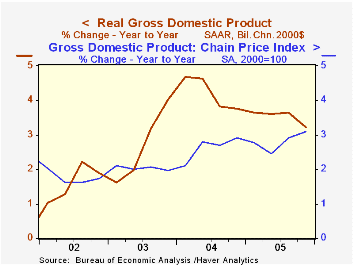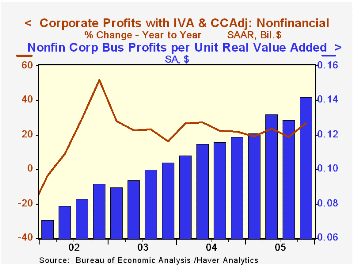 Global| Mar 30 2006
Global| Mar 30 2006US 4Q GDP Little Revised at 1.7%, Profits Surged
by:Tom Moeller
|in:Economy in Brief
Summary
US real growth last quarter was revised up slightly, as expected, to 1.7% (AR) from the preliminary estimate of 1.6% and from 1.1% growth estimated two months ago. This quarter, growth is widely expected to bounce back with several [...]


Domestic demand was reduced during 4Q as personal consumption of motor vehicles & parts slumped 2.9% (-10.6% y/y). Lower auto consumption reduced real GDP growth by 1.9 percentage points but the GDP subtraction from lower auto output was limited to 0.6 percentage points as inventories built up. Overall, real PCE grew just 0.9% at an annual rate (2.9% y/y) during 4Q05, the slowest quarterly rate of growth in over ten years.
Defense spending is now estimated to have fallen 2.3% (+1.7% y/y) and that decline subtracted 0.4% percentage points from 4Q GDP growth.
The drag on GDP growth from a wider foreign trade deficit ballooned to 1.4 percentage points as imports grew 12.1% (AR, 5.3% y/y) while exports rose 5.0% (6.4% y/y).Countering the drag from foreign trade, inventories contributed 1.9 percentage points to GDP growth after more than a year of little or no positive contribution.
The chain price index grew 3.5%, an upward revision from the early estimate of a 3.0% rise. The upside surprise during 4Q was that the price index for private fixed investment grew 5.4% (AR, 3.7% y/y), inflated by an 8.3% (5.2% y/y) jump in residential and a 3.8% (2.8% y/y) rise in nonresidential fixed investment.
| Chained 2000$, % AR | 4Q '05 (Final) | 3Q '05 | Y/Y | 2005 | 2004 | 2003 |
|---|---|---|---|---|---|---|
| GDP | 1.7% | 4.1% | 3.2% | 3.5% | 4.2% | 2.7% |
| Inventory Effect | 1.9% | -0.4% | -0.1% | -0.3% | 0.3% | 0.0% |
| Final Sales | -0.2% | 4.6% | 3.3% | 3.8% | 3.9% | 2.7% |
| Foreign Trade Effect | -1.4% | -0.1% | 0.0% | -0.1% | -0.5% | -0.3% |
| Domestic Final Demand | 1.1% | 4.5% | 3.3% | 3.9% | 4.4% | 3.0% |
| Chained GDP Price Index | 3.5% | 3.3% | 3.1% | 2.8% | 2.6% | 2.0% |
Tom Moeller
AuthorMore in Author Profile »Prior to joining Haver Analytics in 2000, Mr. Moeller worked as the Economist at Chancellor Capital Management from 1985 to 1999. There, he developed comprehensive economic forecasts and interpreted economic data for equity and fixed income portfolio managers. Also at Chancellor, Mr. Moeller worked as an equity analyst and was responsible for researching and rating companies in the economically sensitive automobile and housing industries for investment in Chancellor’s equity portfolio. Prior to joining Chancellor, Mr. Moeller was an Economist at Citibank from 1979 to 1984. He also analyzed pricing behavior in the metals industry for the Council on Wage and Price Stability in Washington, D.C. In 1999, Mr. Moeller received the award for most accurate forecast from the Forecasters' Club of New York. From 1990 to 1992 he was President of the New York Association for Business Economists. Mr. Moeller earned an M.B.A. in Finance from Fordham University, where he graduated in 1987. He holds a Bachelor of Arts in Economics from George Washington University.
More Economy in Brief
 Global| Feb 05 2026
Global| Feb 05 2026Charts of the Week: Balanced Policy, Resilient Data and AI Narratives
by:Andrew Cates






